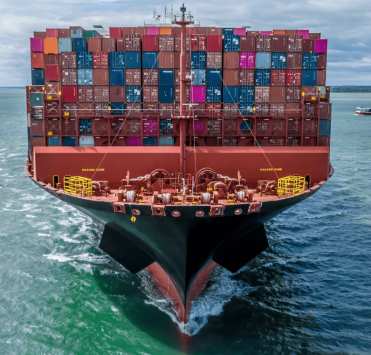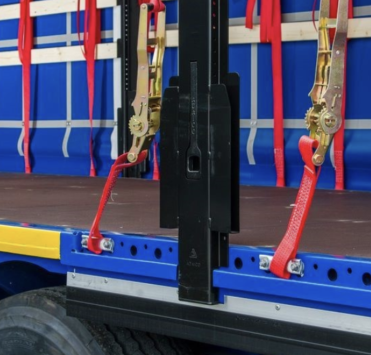Liquid bulk cargo: what is it and how should it be transported correctly?

Liquid bulk cargo is a general logistics term that refers to any substance in a liquid, viscous, or semi-liquid state that is intended for transport without packaging. Such cargoes are transported in bulk, i.e., poured directly into transport containers such as tank trucks, rail and sea tankers, or tank containers. These can be food products (e.g., sunflower oil) as well as chemicals, petroleum products, fertilizers, acids, etc.
The main difference between bulk cargo and packaged cargo is the method of transportation. While traditional cargo is placed in boxes, barrels, or bags, liquid cargo requires completely sealed containers that are resistant to temperature changes, pressure, and chemical exposure.
Key features of bulk cargo:
- Physical and chemical instability.
- Many bulk cargoes are susceptible to changes in temperature and pressure. For example, some acids or oils begin to thicken at low temperatures and require constant heating.
- Container tightness.
- Any leakage can lead to an emergency situation, fines, or environmental damage. Therefore, the transportation of bulk cargo requires the use of tanks that undergo mandatory leak testing before each loading.
- The need for sanitary and technical cleaning.
- The most important requirement for transport containers is cleanliness. Bulk cargoes cannot be loaded without first cleaning the tank, especially if the type of product is changing (for example, if sunflower oil is being transported and a plasticizer is to be loaded).
Classification of bulk cargoes
1. Food bulk cargo
Food bulk cargo is liquid substances intended for consumption or use in the production of food products. This category requires the utmost care, sanitary cleanliness, and strict temperature control.
Examples of food bulk cargo:
- sunflower, rapeseed, soybean, and corn oils;
- fruit juices and concentrates;
- milk and dairy products;
- syrups (glucose, corn, sugar);
- molasses and molasses.
Special features of transportation:
- only in tankers intended for food purposes;
- mandatory polishing of the inner surface of the tank;
- certified sanitary cleaning before each loading;
- isothermal protection or built-in heating (especially in winter).
Transportation of food bulk cargo requires a logistics company to have not only transport, but also technical competence, strict reporting, and sanitary responsibility. Violation of transportation conditions can lead to damage to goods, contamination, and refusal of acceptance at the production site.
2. Chemical bulk cargo
Chemical bulk cargoes are substances that are actively used in industry, construction materials production, pharmaceuticals, and other industries. Such cargoes can be neutral, aggressive, toxic, or explosive.
Examples:
- sulfuric, nitric, acetic, and phosphoric acids;
- sodium hydroxide (caustic soda), ammonia;
- isocyanates, polyols, plasticizers;
- latexes and aqueous polymer dispersions;
- emulsions, monomers, solvents.
Special features:
- Most of these substances must be transported in bulk in tankers with a chemical-resistant coating.
- A safety data sheet (MSDS/SDS) and instructions for handling in case of leakage must be available.
The transportation of bulk chemical cargoes is an area of increased responsibility. An error in the selection of a tanker or insufficient tightness can lead to leakage, corrosion of the container, environmental pollution, and serious legal consequences.
3. Petroleum products and liquid fuels
This group of bulk cargoes is a special category, as it involves flammable and technically complex substances. It includes:
- diesel fuel and gasoline;
- fuel oil, kerosene, aviation fuel;
- bitumen emulsions;
- lubricating oils.
Transportation features:
- mandatory grounding of the vehicle;
- pressure sensors and emergency release valves;
- airtight tank with ADR certification;
The transportation of bulk cargo in this category is strictly regulated. The use of unprepared transport or incorrect documentation may result in cargo delays, fines, or accidents.
4. Feed and technical liquids
This category occupies an intermediate position between food and chemical cargoes. Main items:
- fatty acids (including feed acids);
- glycerin;
- molasses;
- mineral oils and additives;
- liquid additives for compound feed.
Liquid cargoes in this group are sensitive to temperature and require stable storage and transportation conditions. Most of these substances are transported in food or universal tank trucks that have undergone special sanitary treatment.
5. Liquid fertilizers
Widely used in agriculture. Key items:
- UAN (urea ammonium nitrate);
- ammonium thiosulfate;
- liquid ammonia;
- nitrate and phosphate solutions.
Features:
- often transported in tank trucks;
- temperature affects density and viscosity, which requires heating;
- need to monitor pH and chemical compatibility with the tank material.
Why is correct classification important?
Understanding which group a cargo belongs to allows you to:
- select the right type of vehicle;
- determine temperature, ventilation, and tightness requirements;
- prepare the appropriate documents;
- calculate the volume and method of loading;
- minimise risks during transport.
Every mistake in classification is a potential threat to safety, financial losses and the reputation of the logistics operator. Therefore, bulk cargo logistics begins with accurately determining the nature of the substance and all its characteristics.
Transportation of bulk cargo: methods and equipment
The goal of any logistics specialist when transporting bulk cargo is to ensure complete tightness, temperature stability, safety, and volume accuracy.
The main methods of transporting bulk cargo
There are four main methods of transporting liquid cargo in logistics, each of which is selected depending on the volume of the shipment, the route, the type of cargo, and the urgency of delivery.
1. Road transport: tank trucks
Tank trucks are the most common and flexible way to transport bulk cargo. They let you organize door-to-door delivery without having to transfer stuff at intermediate warehouses.
.png)
Types of tank trucks:
- Food tank trucks — made of stainless steel with a polished inner surface, designed for transporting oils, juices, syrups, and milk.
- Chemical tank trucks — with a protective inner coating (fluoroplastic, rubber), designed for aggressive environments: acids, alkalis, solvents.
- Insulated and heated — maintain a stable temperature during the transportation of viscous and temperature-sensitive liquids.
- Sectional tanks — divided into compartments for the simultaneous transportation of different products.
Advantages
- mobility and delivery accuracy
- possibility of using pump unloading
- access to hard-to-reach production sites;
- maintenance of temperature conditions during transport.
Transportation of bulk cargo by tank trucks reduces the risk of leakage and speeds up the logistics cycle. This is particularly relevant for intra-European transport and deliveries to Ukraine from factories in Germany, Belgium, France, the Netherlands, and Poland.
2. Rail tankers
Rail transport is used to transport large quantities of bulk cargo over long distances. This is a cost-effective solution for stable flows between enterprises.

Features
- high load capacity (up to 70 tons per tank)
- possibility of forming entire trains;
- reduced logistics costs per ton of product.
Disadvantages
- strict dependence on railway infrastructure;
- time-consuming route coordination;
- need to organize transshipment to road transport.
Rail transport of bulk cargo is particularly in demand for the delivery of fuel, fertilizers, and bulk chemicals to large agricultural or industrial centers.
3. Sea and river transport: tankers and bulk carriers
Sea logistics for bulk cargo is used for global transportation: export/import of petroleum products, acids, and technical fluids. Special vessels are used for this purpose:
- Tankers — sea vessels with separate sealed compartments;
- Bunkering barges — for delivering fuel to ports;
- River tank barges — for domestic delivery by waterways.
Features:
- capacity to transport tens of thousands of tons in a single voyage;
- temperature and gas control requirements;
- IMO/IMDG standards and port documentation;
- Complex logistics in terms of unloading/transfer.
Container ports such as Gdansk, Rotterdam, Antwerp, and Constanta are important logistics hubs for bulk cargo between the EU and Eastern European countries.
4. Tank containers
Tank containers are versatile ISO tanks (usually with a volume of 24–30 m³) designed for multimodal transport of liquid cargo by road, sea, and rail. They are one of the most flexible tools in modern logistics.
.png)
Advantages:
- standardized dimensions (20-foot container);
- complete tightness;
- possibility of transshipment without opening the container;
- compliance with international standards ADR, RID, IMDG.
Transportation of bulk cargo in tank containers is particularly effective for the export/import of chemicals, fertilizers, glycerin, oils, and fuel. It minimizes risks and speeds up container turnover.
What influences the choice of transportation method?
When choosing a method of transportation for bulk cargo, the following factors are taken into account:
- batch volume;
- product density and viscosity;
- chemical properties and flash point;
- availability of infrastructure (bulk terminals, washing facilities, laboratories);
- delivery times;
- hazardous characteristics (according to ADR/IMDG classification).
The right choice affects the cost of logistics, the level of risk, compliance with regulations, and even the quality of the product.
Documents accompanying the transport of bulk cargo
Each shipment of liquid cargo requires a specific set of documents, which may vary depending on the type of substance, route, and country of destination.
Basic documents:
- CMR consignment note — an international transport document required for road transport within Europe.
- Material Safety Data Sheet (MSDS) — contains information on the composition, hazards, protective measures, and temperature and chemical properties of the substance.
- Cleaning Certificate — confirms that the tank has been cleaned in accordance with sanitary or chemical standards.
- Tank certificate — certifies the technical condition and suitability of the tank for the transport of liquid cargo (including ADR).
- Hazard declaration — for the transport of ADR cargo.
- Driver's instructions — contains step-by-step actions in case of leakage, fire, or accident.
Sanitary requirements for bulk food cargo
Bulk food cargo requires special treatment. The carrier is obliged to:
- use only certified food tankers;
- provide cleaning certificates (internal and external) from an official station;
- prevent mixing of residues with other food products;
- control the presence of odors, sediments, and contamination;
- maintain a specific temperature regime.
Many European customers require photo reports before loading, sanitary certificates no older than 24–48 hours, and analyses of the water used for washing.
Advantages of bulk cargo transportation
1. High logistical efficiency
One of the main reasons for the popularity of bulk transportation is the ability to transport large volumes of liquid cargo in a single shipment. Unlike packaged or containerized cargo, the bulk format allows you to fully utilize the volume of the container without intermediate packaging. This is especially important for edible oils, chemicals, fertilizers, and fuel.
2. Reduced packaging and storage costs
Packaging, filling into canisters, palletizing—all these operations require resources, time, and space. When transporting bulk cargo, packaging is eliminated as a stage. This reduces the cost of logistics and also simplifies unloading at the point of delivery.
3. Less time for loading and unloading
Bulk cargo is loaded through discharge and filling devices using pumps, without manual labor. The processing speed can reach 15–30 tons per hour. This is especially important when working with time-sensitive products (milk concentrates, latexes, emulsions).
4. Minimization of product loss
Modern tank trucks and tank containers ensure tightness, preventing leakage and evaporation even during long-term transportation. This is important when transporting expensive and volatile liquids such as isocyanates, solvents, esters, and fuel.
5. Logistics flexibility
The transportation of bulk cargo can be organized along various routes and using multimodal solutions: road, rail, and sea transport. This expands the geography of deliveries and makes it possible to respond quickly to customer needs.
6. Reduced environmental impact
With proper organization of bulk transportation, the amount of packaging waste, recyclables, and pollution is reduced. The use of reusable tanks reduces the carbon footprint and complies with the principles of sustainable logistics.
Key criteria for choosing a logistics partner
Availability of a fleet of specialized vehicles
A reliable company should have:
- tank trucks with a capacity of 26 to 40 m³;
- thermally insulated and heated tanks;
- tank containers for multimodal logistics;
- tanks certified for the transport of dangerous goods (ADR).
If a company uses only contracted transport, this increases the risks: there is no control over the technical condition of the vehicles, and deadlines and safety depend on third parties.
Experience with bulk cargo
It is important that the logistics operator has practical experience with specific groups of bulk cargo:
- chemical products (latex, acids, solvents);
- food products (oils, syrups, fats);
- petroleum products and fuel;
- liquid fertilizers and feed additives.
Knowledge of the requirements of the sending factories, the specifics of bulk terminals, and certification procedures is a competitive advantage that directly affects the safety and success of transportation.
Why SaveProSolutions?
SaveProSolutions is a reliable Ukrainian partner in the field of bulk cargo logistics, with over 13 years of experience in the international market.
We offer
- A fleet of thermally insulated and ADR tanks
- Full transparency of logistics processes
- Route, temperature, and loading control
- Flexible pricing policy and personalized approach.
We specialize in:
- Transportation of chemical products from BASF, DOW, DEZA, Synthomer, Ineos, Sasol, and other European manufacturers;
- Delivery of vegetable oils;
- Transportation of liquid fertilizers and feed additives;
- accompanying complex projects with temperature, hazardous, and seasonal requirements.
How to order bulk cargo transportation?
To order bulk cargo transportation, follow a few simple steps:
- Contact a SaveProSolutions manager in any convenient way — by phone, via the website, or by email.
- Provide key details: type of bulk cargo, volume, loading and unloading locations, desired dates.
- If necessary, provide a material safety data sheet (MSDS), temperature requirements, and ADR availability.
- Receive a quick cost estimate and a proposal for the type of transport (tank truck, container, multimodal route).
- Confirm your request and receive confirmation of your transport booking with the date of departure.
- During the transport stage, you will have full control: route, status, documents, photo reports, and access to your personal manager.









